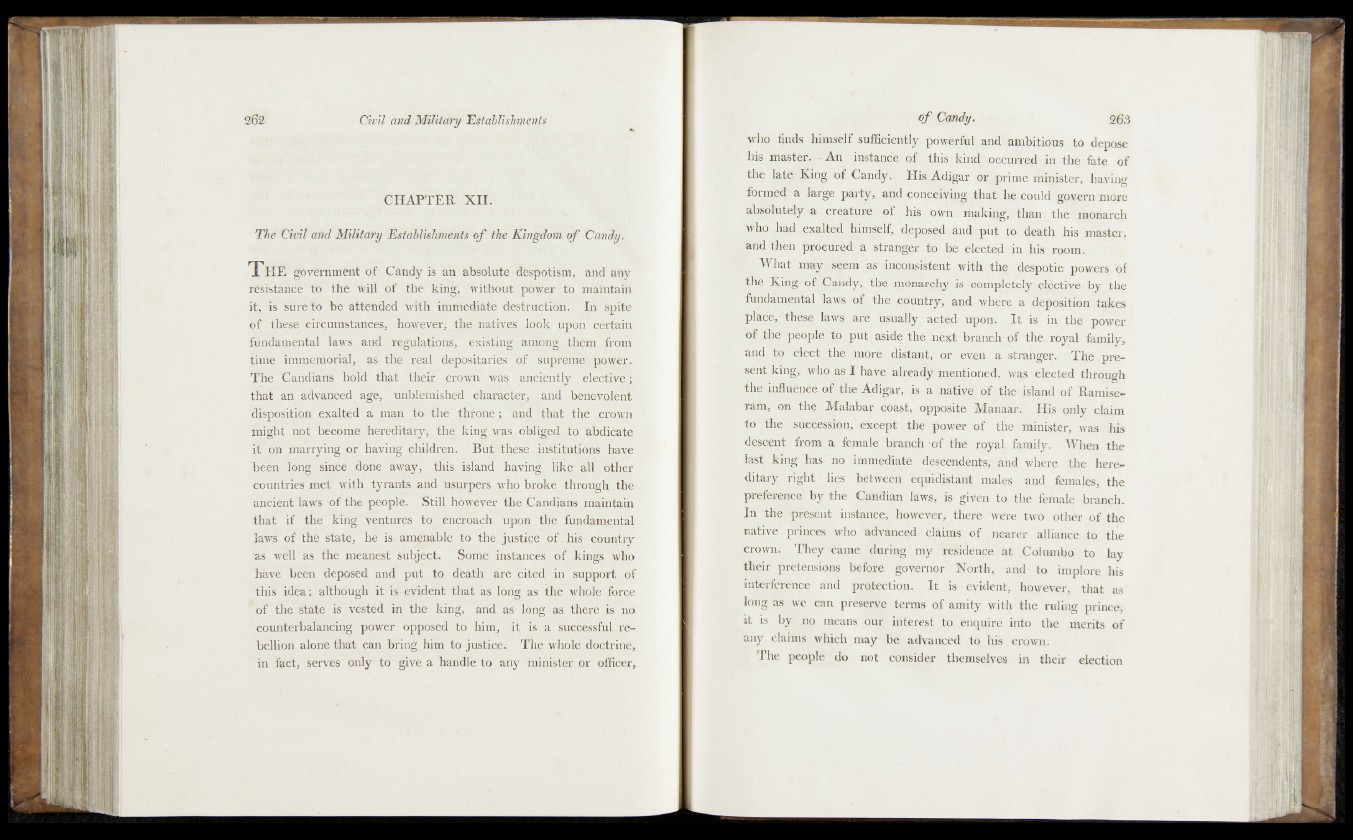
CHAPTER X II.
The Civil and MUitûry ÈstablkhmenU o f the Kingdom o f Candy.
T h e gövèrttmêrit of Càhdy is an absolute Abspotisrn, and any
féÂîstaritië fo thé -frill of the kte|çy Without poster to "maintain
it, fs küréfó be attended with immediate destruction. In spite
Of these^ circumstances, however, the natives look uppn certain
fundamental laws and regulations, ' existing^ among them from
lamé immemorial, as the real depositaries ^i^supremë^ 'pp^er.
The' Candiâns hold that their brown wasj.t^ejentlyT^lec^e ;
that an advanced age, unblemished character,, lan d .benevolent
disposition exalted a man to-the throne; "and'thatMh'elerqwn
might not become hereditary, the king wa~s- obliged;tp abdicate
it on marrying or having children. ButSthese mstitamOns have
freëh long since done away, this island having like7 a^fother
countries met with tyrants and usurpers who broke',through .the
ancient laws of the people. Still however the Candians maintain
that if the king ventures to ..encroach upon the fundamental
laws of thé state, he is. amenable to the’ justice ;of_hisr cquntry
'as wëll.lls the meanest subject. §ome instances' qf„kip||s who
hâve been deposed and put to death': âré cited in support of
this idea; although it is-evident that as long as the whole force
■ of the state is vested in the king, and as long as there is hO
counterbalancing power opposed to him, it is a successful rébellion
alone that can bring him to justice. The whole doctrine,
in fact, serves only to give, a handle to any minister or officer,
who |n d s hknâelf sufficiently powerful and ambitious to depose
his m a s te rjp iu . instance ©f. this kind' ipcçurired in the fate of
the late“ King, of Candy. HisAdigar ocyprime minister, having
formed a large party, and conceiying .that he copld govern more
absolutely a creature of his own ’ making, than the monarch
who |i,ad exaljed himgelf, .dcixisefeand put to death his master’,
and then proehrld- a stranger to bfe elected in his room.
1; What'.'may- seem Ö inconsistenit with despotic powers of
^the Kihg^c^feahdy, the ’m0parchy iSj5 completely,»dpetive. by the
fundanfental fefrk'i^f the^ ^hhtry, „and whefë^a deposition takes
p këe,‘These lawte., are usually 'acted' upoijy > Itpis in the power
of the peoplg; to put aside thApg|dj. branch pf the róyal family,
and they more ^ distant,! oy ,_py|p a stranger. The prey
^éht^kirig, who as I have' already jnenfioned, was 'elected through
the influence'pf the Adigar, is^j| native of the’island of Ramises
ram, on the Malabar coast, opposite Manaar. His only claim
€o tee;succession, except the power ©f the-minister, was his
d e c en t from a female branch ‘of the royal family;I When the
last king has no immediate1';deseend@nts; and’ where the here-
ditaiy right lies between equidistant males ;and females, thè
preference by the C&ndian laws, -is given to the female branch.
In the present instance, however, there were) two other of the
native princes who advanced claims of /nearer alliance to the
brown. They eame during my résidence àt- Cqlmnbo to lay
their pretensions before governor Uforth, and to implore his
interference and protection. I t is évident, however, that as
long as we ean preserve terms of amity with tee ruling prince,
it is by „no means our interest to enquire into the merits of
any claims which may be advanced to hjs erown.
The people dp not consider themselves in their election